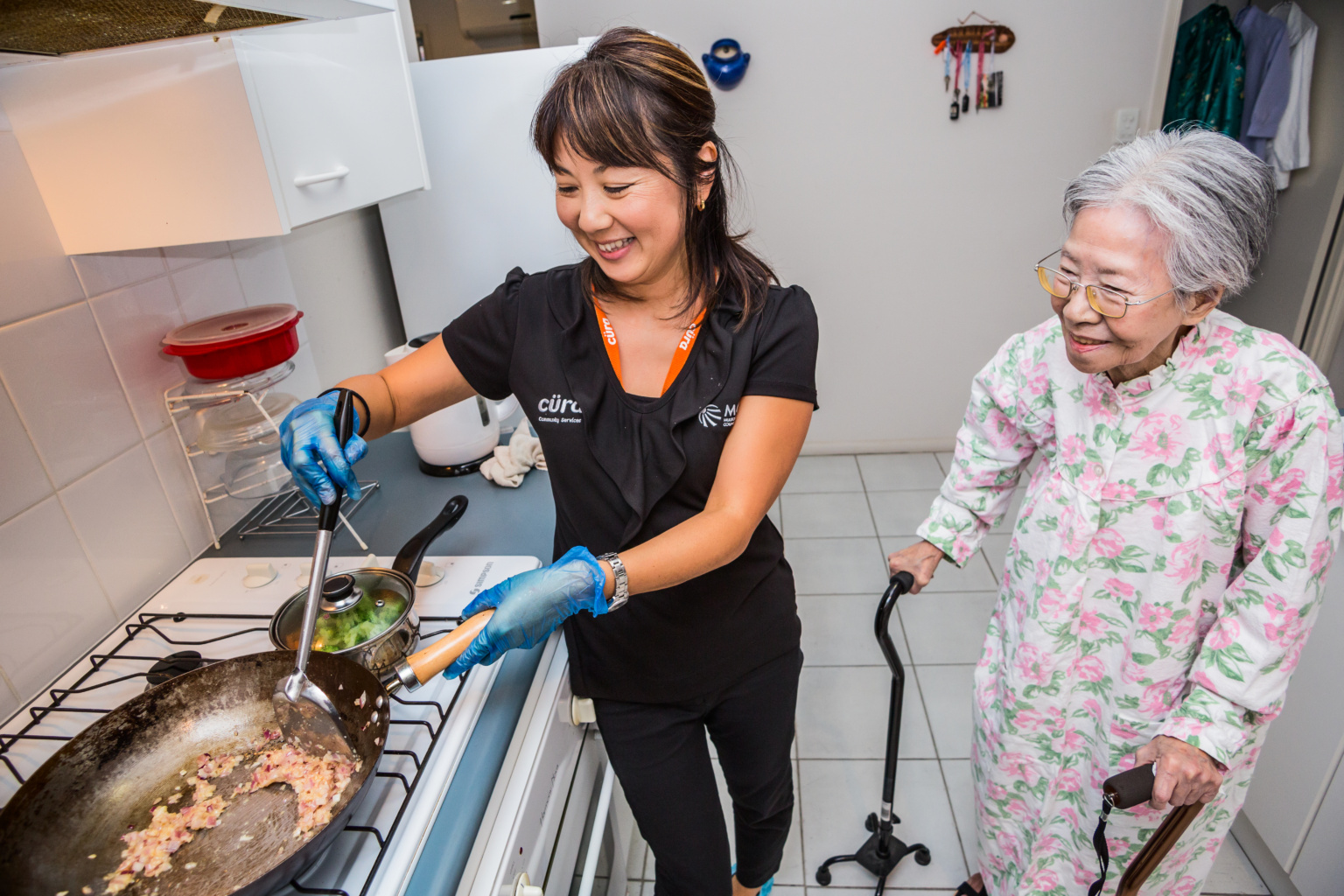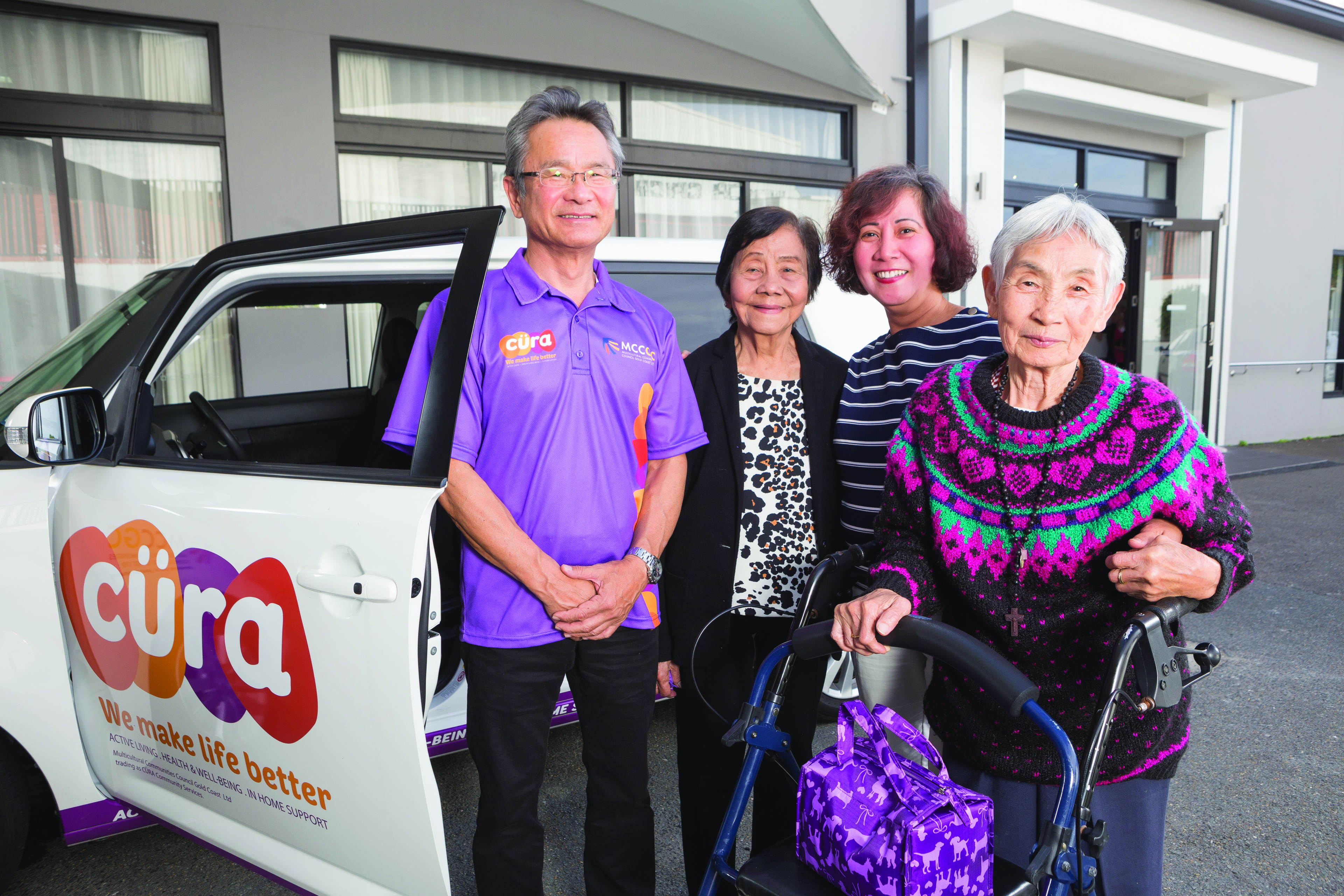When we think about aged care, we often think of health, safety, and daily support. But true care goes far beyond meeting medical needs, it’s about creating a life filled with comfort, connection and belonging. For seniors from diverse cultural backgrounds, aged care that embraces multiculturalism provides something deeply powerful: the ability to feel at home, even in care.
In today’s Australia, where our communities are shaped by cultures from every corner of the globe, multicultural aged care is not just an option – it’s essential for ensuring that every senior receives care that respects their identity. Everyone deserves to age with dignity, respect, and a strong sense of identity. For multicultural seniors, this means receiving care that honours their cultural backgrounds, traditions and values.
Australia is one of the most culturally diverse countries in the world, and our aged care system must reflect this richness to truly meet the needs of all older Australians. As our population ages, it’s more important than ever that our aged care approach evolves to recognise the diverse cultural tapestry of our communities. Supporting seniors to maintain their identity and feel at home is not just good practice, it’s fundamental to good care.
Australia’s Cultural Diversity: A Beautiful Foundation for Inclusive Care
Australia’s diversity is one of its greatest strengths. In Queensland alone, more than 13.9% of people aged over 50 are from Culturally and Linguistically Diverse (CALD) backgrounds. On the Gold Coast, over 111,000 seniors aged 65+ call the region home, many of whom speak languages other than English, practice unique traditions, and maintain strong cultural ties. Similar stories can be found across the Tweed, Sunshine, Gold Coast, and Moreton regions, where multicultural seniors are an essential part of the community.
For these seniors, aged care is not simply about assistance, it’s about trust, dignity, and cultural safety. Cultural safety means creating environments where seniors feel respected, understood, and free from discrimination. It recognises the whole person, not only their medical needs, but also their beliefs, values, traditions, and emotional wellbeing.
By embracing multicultural care, aged care providers like Cura Aged Care are shaping a more inclusive, compassionate, and supportive future for all seniors.
Why Cultural Considerations Matter
Culture isn’t just about language or food, it’s about how people see the world, express love, grieve, celebrate and connect with others. For seniors from CALD backgrounds, receiving culturally safe and sensitive care can:
- Provide comfort and familiarity in later life
- Help maintain dignity and personal identity
- Improve mental health and reduce feelings of isolation
- Encourage greater trust and communication between senior and care team
- Support spiritual and emotional wellbeing
- Honour the stories and journeys that have shaped a person’s life
When these elements are missing, older people can feel misunderstood, overlooked or excluded. Their voices may be drowned out in systems that don’t reflect their reality. That’s why at Cura Aged Care, we work hard to ensure our care is inclusive, respectful, and personalised – because care that recognises the whole person leads to better outcomes and happier lives
The Value of Multicultural Aged Care
1. Emotional Wellbeing
Familiar language, food, and cultural practices bring comfort. When seniors see their culture reflected in their care, they feel recognised and valued. This sense of belonging enhances mental and emotional wellbeing, reducing feelings of isolation and anxiety.
2. Social Connection and Community
Cultural programs and celebrations encourage seniors to connect not only with their own traditions but also with others from different backgrounds. This exchange creates opportunities for friendships, storytelling and shared happiness.
3. Respect for Cultural Practices in Care Delivery
Every culture carries its own beliefs around health, family and ageing. Whether it’s dietary preferences, prayer times, or family involvement in care decisions, multicultural care honours these practices as essential, not optional, parts of daily life.
4. A Diverse and Empowered Workforce
A multicultural team of care partners, medical practitioners, specialists and carers brings language skills, cultural knowledge, and empathy that reflect the communities they serve. This not only improves communication but also creates an enriched workplace, where staff learn from one another and from the seniors they support.
5. Enriching Everyday Life
From music and food to festivals and storytelling, multicultural aged care infuses daily living with creativity and vibrancy. Seniors are reminded that care is not just about what is needed, it is about what makes life meaningful.
Practical Ways to Supports Cultural Inclusion
Our aged care system needs to continue to take real steps to ensure our aged care services are inclusive of cultural. It is important to recognise that inclusive care is not simply an ideal, it must be built into our everyday actions and decisions.
-
Multilingual Support and Interpreting Services – Why Language Matters
Language should never be a barrier to compassionate, high-quality care. Seniors and their families deserve to communicate in the language they know best—it’s foundational to building trust, dignity, and emotional wellbeing. That’s why aged care providers like Cura Aged Care prioritise multilingual support and professional interpreting services at every stage of care.
Key Elements of Effective Language Support:
- Multilingual Staff: Caregivers, coordinators, and support teams who are fluent in languages commonly spoken in the community. This allows providers to connect more personally with participants, making them feel heard, respected and understood.
- Professional Interpreters: For languages not covered by staff, certified interpreters trained in healthcare and aged care terminology are vital. Whether in-person, over the phone, or via video, interpreters ensure conversations about health, wellbeing, and care plans are accurate and accessible.
- Culturally Sensitive Communication: More than just translation, communication should reflect respect for tone, gestures and cultural norms, especially when discussing sensitive issues such as health, independence, or end-of-life (Palliative) care.
- Support Across All Touchpoints: Language services should be available throughout the care journey:
- Initial consultations and needs assessments
- Care plan development and reviews
- Ongoing updates, feedback, and family meetings
- Emergency situations and hospital visits
- Empowering Families: By enabling communication in preferred languages, providers empower families to actively participate in care decisions. This reduces stress, builds trust, and strengthens relationships between caregivers, seniors, and their families.
“In 2021, 8.2% of older Queenslanders reported speaking a language other than English at home.”
Clear communication is not just a convenience, it’s a cornerstone of dignity, safety, and emotional wellbeing. Multilingual and interpreting services bridge gaps, foster understanding, and create a truly inclusive care environment.
2. Cultural Training for Teams
In today’s diverse communities, cultural awareness is not optional—it is essential. Aged care organisations across Australia have a responsibility to ensure their care workers and support staff are equipped with the knowledge, skills, and empathy needed to provide inclusive, respectful, and person-centred care.
- Regular, In-Depth Training: Care teams should participate in structured cultural awareness and cultural safety training throughout the year. These sessions go beyond surface-level education, incorporating real-world scenarios, reflective practices, and insights relevant to the communities being served.
- Understanding Cultural Nuances: Training equips staff to recognise and respond to differences in communication styles, family dynamics, dietary preferences, religious practices, and attitudes toward health and ageing. This prevents assumptions and enables delivery of care that feels genuinely person-centred.
- Empathy in Action: Cultural training fosters emotional intelligence and empathy. Staff learn to listen actively, ask respectful questions, and adapt their approach to honour the unique cultural needs of each client, whether that involves adjusting routines, supporting traditions, or showing sensitivity in daily interactions.
- Inclusive Care Planning: Best practice aged care includes integrating cultural considerations into individual care plans. This could involve celebrating cultural holidays, supporting spiritual practices, or involving extended family members in decision-making, depending on each client’s preferences.
- Collaborating with Communities: Partnering with local cultural organisations, leaders, and networks ensures providers remain responsive to the changing needs of diverse populations. This strengthens trust and deepens understanding of the communities being supported.
- Creating a Safe Space: Cultural safety means seniors feel secure, respected, and free from discrimination. Training should empower staff to foster environments where older people can express themselves fully and feel at home, no matter their background.
Cultural training is more than policy; it is a guiding philosophy that underpins inclusive care. By embedding cultural competence across their teams, aged care organisations can ensure services are not only effective but also deeply respectful and empowering for every individual.
3. Celebrating Cultural Traditions and Holidays
Cultural traditions are more than dates on a calendar, they are powerful expressions of identity, heritage, and belonging. For many seniors and their families, recognition of these traditions is essential to feeling valued, respected, and connected. That’s why organisations should make it a priority to acknowledge and celebrate the diverse cultural events that matter most to those they support.
- Inclusive Celebrations: From Lunar New Year and Diwali to Eid, Orthodox Easter, NAIDOC Week, or a traditional tea ceremony, organisations can embrace a wide range of cultural observances. Working with participants and their families ensures that the most meaningful events are celebrated in ways that feel authentic and respectful.
- Personalised Festivities: Celebrations can be tailored to individual preferences, whether through traditional decorations, meaningful meals, music, storytelling, or rituals that evoke the warmth and familiarity of home.
- Community and Connection: Events provide opportunities for participants to share culture with peers, staff, family, and the broader community. These moments build bridges between cultures, spark conversations, and encourage mutual respect.
- Emotional Wellbeing: Engaging in cultural traditions can bring comfort, rekindle memories, and reinforce identity. For seniors who may feel isolated or disconnected, these celebrations can provide joy, continuity, and a stronger sense of belonging.
- Education and Awareness: Celebrations also present valuable learning opportunities. Encouraging staff to engage with and understand the cultural significance of each event deepens collective awareness and strengthens an organisation’s commitment to inclusive care.
- Partnering with Cultural Groups: Collaborating with local cultural organisations, community leaders, and artists helps bring authenticity to celebrations. These partnerships ensure that traditions are honoured in meaningful ways and that events truly reflect the spirit of the cultures represented.
Celebrating cultural traditions is not just about festivity, it’s about affirming identity, nurturing relationships, and creating care environments where everyone feels at home. Through these shared moments, organisations can build inclusive communities that honour heritage while embracing the present.
4. Matching Clients and Carers
Where possible, aged care organisations need to aim to match clients with support workers who understand or share their language and cultural background. These connections can make a significant difference, helping seniors feel comfortable, understood, and confident in their daily routines.
- Cultural and Linguistic Alignment: When clients are supported by staff who speak their language or understand their cultural background, communication is smoother, stress is reduced, and interactions become more meaningful, whether discussing health concerns or sharing stories.
- Faster Rapport and Trust: Shared cultural experiences often build trust more quickly. Clients feel at ease, and carers are better able to anticipate needs, respect preferences, and provide care that feels intuitive and familiar.
- Comfort in Daily Routines: From preparing culturally appropriate meals to understanding religious practices, family dynamics, or traditional healing methods, culturally aligned carers can tailor routines to reflect each client’s lifestyle and values. This helps maintain dignity and comfort in every aspect of care.
- Emotional and Social Wellbeing: Beyond practical support, these connections foster emotional wellbeing. Seniors often feel less isolated and more understood, particularly if they have experienced cultural displacement or language barriers.
- Respecting Identity and Autonomy: Matching clients with culturally compatible carers honours their identity. Organisations listen to preferences and feedback and are committed to making adjustments to ensure every client feels respected and empowered.
- Flexible and Responsive Matching: While organisations strive to create ideal matches from the start, flexibility is essential. If a client’s needs or preferences change, reassessment ensures the best possible care relationship, recognising that care should evolve with the person.
Prioritising cultural compatibility in client-carer relationships transforms everyday care into a deeply personal and affirming experience. This approach helps aged care organisations like ours, deliver services that are not only professional but truly compassionate, inclusive and responsive to the diverse needs of the communities they serve.
5. Culturally Appropriate Meals and Activities
Providing meals and activities that respect dietary needs, cultural preferences, and individual traditions is essential in multicultural aged care. Sharing familiar foods or participating in cultural storytelling, music and creative activities can bring comfort, spark memories, and foster meaningful engagement.
Food and activities are powerful expressions of culture, identity, and memory. Aged care organisations that prioritise culturally relevant meals and programs help create a sense of home, support meaningful engagement, and promote overall wellbeing.

Respecting Dietary and Cultural Preferences
- Personalised Meal Planning: Organisations work closely with participants and their families to understand dietary requirements, religious restrictions, and cultural food traditions. Whether it’s halal, kosher, vegetarian, or region-specific cuisine, meals are designed to be nourishing, culturally appropriate, and comforting.
- Familiar Flavours, Comforting Memories: Serving beloved dishes from childhood or traditional holiday meals can evoke powerful memories and emotions. These familiar flavours offer connection, comfort, and a sense of belonging.
- Inclusive Dining Experiences: Mealtimes can be social and celebratory. Communal dining encourages sharing stories, swapping recipes, and enjoying the richness of each other’s cultures.
Activities That Reflect Identity and Tradition
- Culturally Inspired Programs: Activity calendars should include events and workshops that honour participants’ faith, traditions, and interests, such as:
- Cultural storytelling and oral history sessions
- Traditional music and dance
- Arts and crafts inspired by cultural motifs
- Language clubs or conversation circles
- Faith-based gatherings and spiritual support
- Celebrating Heritage Through Engagement: These activities affirm identity, helping participants stay connected to their roots, express themselves creatively, and share their heritage with others.
- Flexible and Participant-Led: Organisations encourage participants to guide programming, suggesting favourite dishes, leading workshops, or requesting celebrations. Their input ensures activities remain meaningful and engaging.
- Therapeutic Benefits: Participating in culturally familiar activities can reduce anxiety, improve mood, and enhance cognitive function, particularly for clients living with dementia or adjusting to new environments.
By embedding cultural relevance into meals and activities, aged care organisations provide care that feels personal, respectful, and joyful. This approach goes beyond meeting practical needs, it celebrates lives, honours traditions, and fosters a vibrant, inclusive community where every participant feels valued and at home.
6. Inclusive Spaces and Representation
Multicultural aged care organisations recognise that physical environments and visual cues have a profound impact on how people feel. Thoughtful design, inclusive signage, and culturally relevant décor help participants feel welcomed, respected, and at home. By intentionally creating spaces that reflect the diversity of the communities they serve, organisations foster inclusion and connection.
Visual Representation That Speaks to Everyone
- Multicultural Artwork and Decor: Care settings display artwork, photographs, and cultural symbols representing a wide range of traditions and backgrounds. These visual elements celebrate diversity and allow participants to see their own stories reflected in the environment around them.
- Inclusive Signage and Language: Multilingual signage and materials support accessibility and comfort. Seeing one’s native language on a welcome sign, notice, or informational material can immediately foster a sense of belonging.
- Culturally Relevant Reading Materials: Libraries and common areas include books, magazines, and newspapers in different languages and from diverse cultural perspectives, offering both entertainment and meaningful connection.
Spaces That Support Spiritual and Cultural Practices
- Prayer and Reflection Areas: Quiet, respectful spaces are provided for prayer, meditation, or spiritual reflection, designed to accommodate a variety of faiths and practices.
- Music and Media in Multiple Languages: Background music, cultural radio stations, or TV programs in participants’ native languages help create a comforting and familiar atmosphere.
- Celebration Corners and Cultural Displays: Themed spaces honour cultural holidays and observances, complete with decorations, educational materials, and opportunities for participation.
Thoughtful Design for Comfort and Identity
- Personalised Living Spaces: Participants are encouraged to personalise their rooms with items that reflect their heritage—family photos, religious symbols, traditional textiles, or personal mementos—helping transform care settings into true homes.
- Community Input in Design: Feedback from participants, families, and cultural advisors is actively sought when designing or updating spaces, ensuring environments are both inclusive and meaningful.
Creating inclusive spaces goes beyond aesthetics. It is about cultivating environments where every person feels seen, safe, and valued. Through intentional design and thoughtful representation, aged care organisations can celebrate diversity, foster genuine belonging, and ensure that every participant feels at home.
Why Multicultural Aged Care Matters for Families
For families seeking aged care for a loved one, knowing that cultural needs will be respected brings enormous peace of mind. It ensures that care is not generic, but deeply personal, honouring language, traditions, heritage and identity. When a parent can speak in their own language, enjoy familiar meals, or be supported in spiritual practices, families know their loved one’s identity is being honoured, not overlooked.
Building a Community of Connection, Culture and Compassion
Multicultural aged care is about more than policies, it’s about heart. It’s about recognising that every senior carries a lifetime of stories, traditions and values that deserve to be honoured. By embedding culture into care, we have an opportunity to create spaces where multicultural participants feel safe, families feel reassured, and staff feel inspired.
At Cura Aged Care, we believe that celebrating diversity makes us stronger, more compassionate, and better prepared to meet the needs of our communities across the Gold Coast, Sunshine Coast, Tweed, and Moreton regions. Cultural inclusion is not a one-off initiative for our team; it’s a continuous journey guided by listening, learning, and adapting. The stories of our diverse seniors shape our policies, guide our decisions, and inspire our team.
Honouring First Nations Elders
Caring for First Nations Elders is a privilege that multicultural aged care providers understand and take very seriously. They recognise the unique histories, strengths, and trauma experienced by Aboriginal and Torres Strait Islander peoples. Like multicultural care, honouring First Nations seniors should include:
- Culturally appropriate engagement and relationship-building
- Supporting connections to Country, culture and family
- Respecting spiritual and community leadership roles
- Providing space for storytelling and cultural expression
At Cura Aged Care, we honour the resilience and wisdom of our First Nations Elders and are committed to walking alongside them in a spirit of respect and reconciliation.
You Belong Here: Multicultural Aged Care Truly Enhances Senior Living
Multicultural aged care providers, including Cura Aged Care, see you, hear you, and value your personal story. Whether you or your loved one speaks another language, follows particular customs, or simply needs a little extra understanding, multicultural service providers are unique in their commitment to delivering support that truly meets senior care needs, enhances senior living and supports cultural needs.
Everyone deserves to feel at home in aged care, no matter their background, language, or cultural traditions. By embedding multicultural care into aged care services, we as a community can ensure that care goes beyond clinical and practical needs to honour the full humanity, heritage, and identity of every individual.
Together, our organisations are creating aged care communities where everyone is respected, celebrated, and genuinely included, fostering comfort, connection, and a true sense of belonging for all seniors.
Source References:
https://www.goldcoast.qld.gov.au/About-our-city/Population-data/Statistics-for-seniors
https://www.families.qld.gov.au/_media/documents/seniors/population-fact-sheet.pdf






